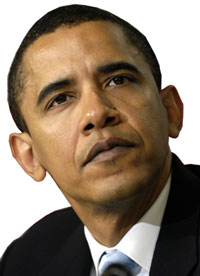By Ron Walters
-Guest Columnist-

The specter grows that finds Senator Barack Obama being turned into a national phenomenon, drawing huge crowds of people wanting to touch the hem of his garment and catch the verbal morsels that fall from his lips wherever he goes. So massive has been this response that it has sparked a political culture of speculation about his chances of running for president in 2008, especially as he travels to places like the testing ground of New Hampshire.
What people find attractive about Barack is first, his background, a White mother and Kenyan father, his early residences in Hawaii, Indonesia, Kansas — all giving off the scent of a multi-racialism in his growing up. Then, there is his degree from Harvard Law School and his role as the first Black editor of the Harvard Law Review, traditionally suggesting high intelligence, that he used in establishing a political career in state level politics, making a sound record of accomplishment. Finally, there are the intangibles of charisma, the earnestness in his voice, the self-deprecating, even folksy style and easily likable smile. These are telegenic qualities that fit well in a media where personal appeal is the stuff of political allure. It may even trump concerns about his limited political experience.
So, Barack has attracted the curious, selling out halls in a rock-star fashion, eliciting the “run, Barack, run” chant heard when Rev. Jesse Jackson was also making up his mind about getting into the race for president in 1984. But this chant is not coming from Blacks. Therein is the difference. Race and politics are in this equation, covered up right now by the hype, but positioned to bolt to the surface at the right moment. That is why the savvy Obama began his speech in New Hampshire recently saying that he was “suspicious of the hype.”
Obama is as aware of any one of the lingering fictitiousness of public opinion polls when it comes to assessing White support for Black candidates. When Tom Bradley, the Black mayor of Los Angeles, barely lost a race for governor in 1982, a pattern was observed: He received his high poll numbers, but a low final vote from Whites. The same thing happened to David Dinkins when he ran for mayor of New York City, and Doug Wilder when he ran for governor of Virginia, creating a belief among analysts that the true level of support by White voters for Black candidates is much less than believed.
What political scientists know is that context is important in judging White support for Blacks. This was seen in the recent election where Deval Patrick was elected governor of Massachusetts, an overwhelmingly White state. But in the background, as in every state, was an explosive vote against the current administration, amounting to more than 60 percent in some national polls, for its handling of the war in Iraq. Context may also configure the politics of 2008.
In my most recent book, “Freedom Is Not Enough,” I create a “Jackson Model” for Black candidates running for president and compare it to the campaigns of Carol Moseley Braun and Rev. Al Sharpton in the 2004 elections. But there is a distinct difference when Black candidates run from a progressive base of Black, women, low-income, civil-rights challenged, etc. voters, or whether they position the campaign toward a moderate electorate. As a potential candidate already favored by the White mainstream and running second in polls to Hilary Clinton at this writing, the prospect is great that Obama would run toward the main body of the electorate that is to the right of Blacks.
This raises the question of where his base will be. He may well attract Black voters as a base, who will give him some issue slack, because of the view that he may just be the first genuine Black candidate to win the presidency. But there is great resentment among some Blacks over the rightward drift of the Democratic Party; and if he adds to that, he could be in trouble with Black voters.
I think that Barack Obama should run for president, especially since he doesn’t lose politically. Even if he loses the nomination fight, it heightens his leadership profile in national politics and virtually ensures his Senate re-election in 2010. Right now, Obama’s true political value is unknown because of the curiosity factor. In the 2000 election, Alan Keyes, Obama’s 2004 opponent for his Senate seat in Illinois, drew large crowds to hear him speak, but he attracted few votes. Separating the entertainment factor from a political judgment may well be Obama’s most trying chore in making up his mind. Of course, if he finds a creative way to use it, that will be all to the good.
(Ron Walters is the Distinguished Leadership Scholar, Director of Government and Politics at the University of Maryland College Park. )












